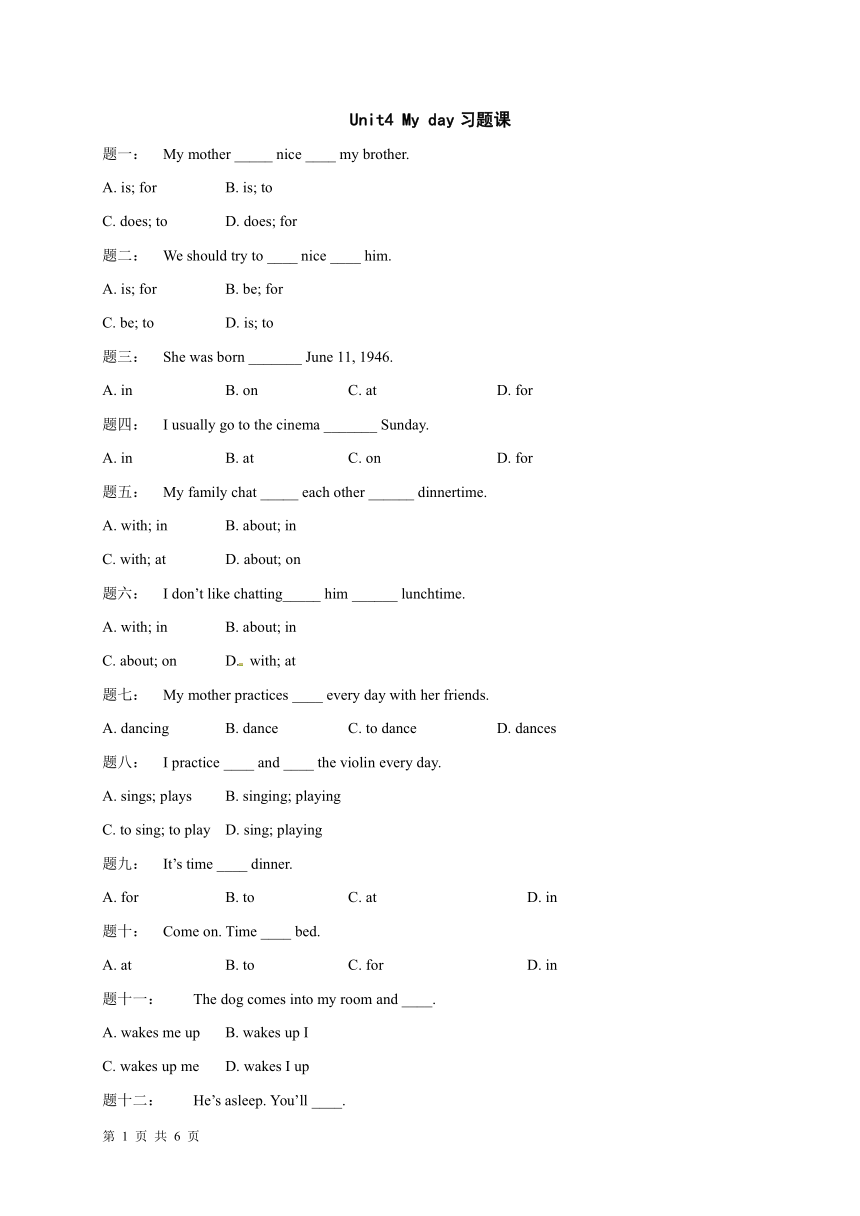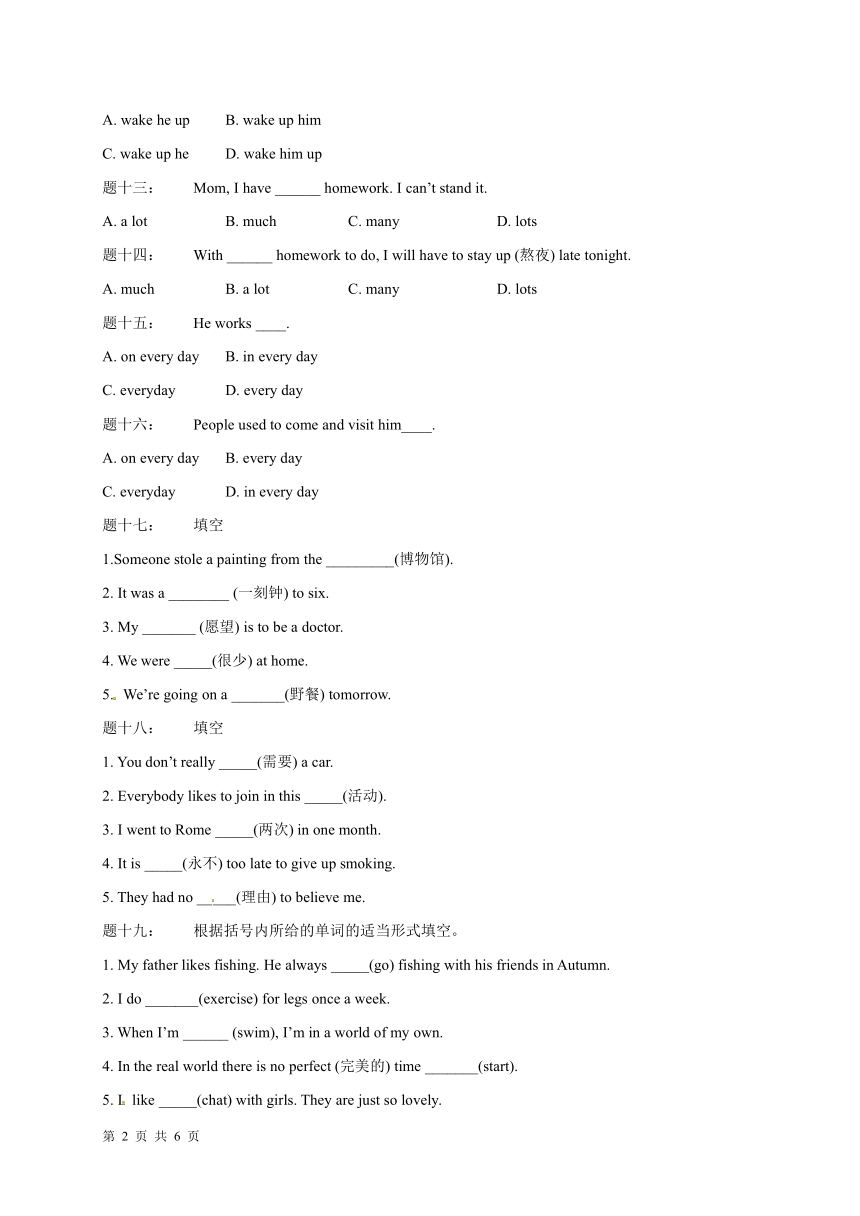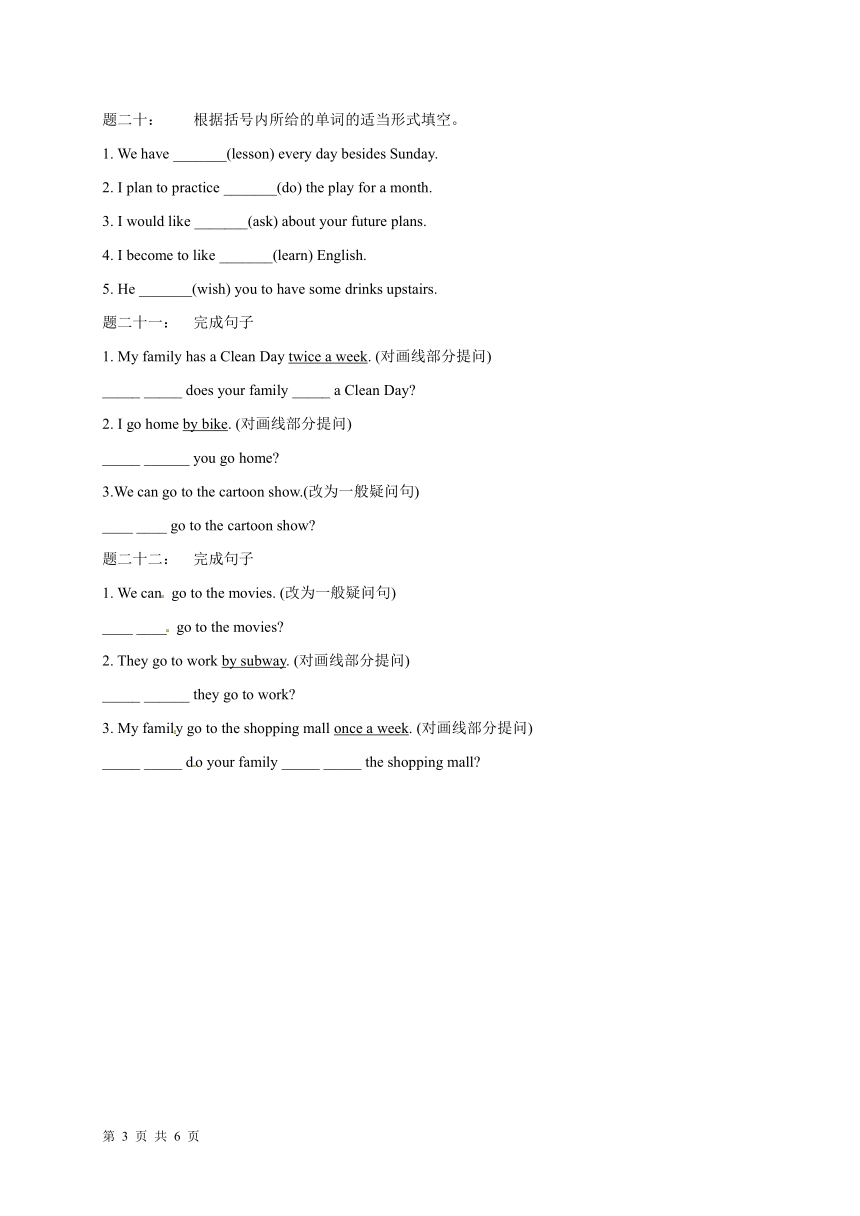Unit 4 My day.同步练习(有答案)
文档属性
| 名称 | Unit 4 My day.同步练习(有答案) |  | |
| 格式 | zip | ||
| 文件大小 | 112.5KB | ||
| 资源类型 | 教案 | ||
| 版本资源 | 牛津译林版 | ||
| 科目 | 英语 | ||
| 更新时间 | 2018-08-07 11:53:03 | ||
图片预览



文档简介
Unit4 My day习题课
My mother _____ nice ____ my brother.
A. is; for B. is; to
C. does; to D. does; for
We should try to ____ nice ____ him.
A. is; for B. be; for
C. be; to D. is; to
She was born _______ June 11, 1946.
A. in B. on C. at D. for
I usually go to the cinema _______ Sunday.
A. in B. at C. on D. for
My family chat _____ each other ______ dinnertime.
A. with; in B. about; in
C. with; at D. about; on
I don’t like chatting_____ him ______ lunchtime.
A. with; in B. about; in
C. about; on D. with; at
My mother practices ____ every day with her friends.
A. dancing B. dance C. to dance D. dances
I practice ____ and ____ the violin every day.
A. sings; plays B. singing; playing
C. to sing; to play D. sing; playing
It’s time ____ dinner.
A. for B. to C. at D. in
Come on. Time ____ bed. [来源:学科网]
A. at B. to C. for D. in
The dog comes into my room and ____.
A. wakes me up B. wakes up I
C. wakes up me D. wakes I up
He’s asleep. You’ll ____.
A. wake he up B. wake up him
C. wake up he D. wake him up
Mom, I have ______ homework. I can’t stand it.
A. a lot B. much C. many D. lots[来源:学科网ZXXK]
With ______ homework to do, I will have to stay up (熬夜) late tonight.
A. much B. a lot C. many D. lots
He works ____.
A. on every day B. in every day
C. everyday D. every day
People used to come and visit him____.
A. on every day B. every day
C. everyday D. in every day
填空
1.Someone stole a painting from the _________(博物馆).
2. It was a ________ (一刻钟) to six.
3. My _______ (愿望) is to be a doctor. [来源:学科网ZXXK]
4. We were _____(很少) at home.
5. We’re going on a _______(野餐) tomorrow.
填空
1. You don’t really _____(需要) a car.
2. Everybody likes to join in this _____(活动).
3. I went to Rome _____(两次) in one month.
4. It is _____(永不) too late to give up smoking.
5. They had no _____(理由) to believe me.
根据括号内所给的单词的适当形式填空。
1. My father likes fishing. He always _____(go) fishing with his friends in Autumn.
2. I do _______(exercise) for legs once a week.
3. When I’m ______ (swim), I’m in a world of my own.
4. In the real world there is no perfect (完美的) time _______(start).
5. I like _____(chat) with girls. They are just so lovely.
根据括号内所给的单词的适当形式填空。
1. We have _______(lesson) every day besides Sunday.
2. I plan to practice _______(do) the play for a month.
3. I would like _______(ask) about your future plans.
4. I become to like _______(learn) English.
5. He _______(wish) you to have some drinks upstairs.
完成句子
1. My family has a Clean Day twice a week. (对画线部分提问)
_____ _____ does your family _____ a Clean Day?
2. I go home by bike. (对画线部分提问)
_____ ______ you go home?
3.We can go to the cartoon show.(改为一般疑问句) [来源:学§科§网]
____ ____ go to the cartoon show?
完成句子
1. We can go to the movies. (改为一般疑问句)
____ ____ go to the movies?
2. They go to work by subway. (对画线部分提问)
_____ ______ they go to work?
3. My family go to the shopping mall once a week. (对画线部分提问)
_____ _____ do your family _____ _____ the shopping mall?
Unit4 My day习题课
B
解析:句意为“我的妈妈对我弟弟很好。”be nice to亲切的,体贴的。主语是My mother,所以be动词用is。故选B。
C
解析:句意为“我们应该努力对他好。”be nice to亲切的,体贴的。try to后接动词原形。所以选be; to。
B
解析:句意为“她在1946年6月11号出生。”具体的某一天前用介词on。故选B。
C
解析:句意为“我通常在星期天去看电影。”星期几前用介词on。故选C。
C
解析:句意为“我家人在晚餐时间互相聊天。”chat with...与……聊天,at dinnertime在晚餐时间。故选C。
D
解析:句意为“在午餐时间我不喜欢和他聊天。”chat with...与……聊天,at lunchtime在午餐时间。故选D。
A
解析:句意为“我妈妈每天和她朋友练习跳舞。”practice doing sth. 练习做某事,所以选dancing。故选A。
B
解析:句意为“我每天练习唱歌和拉小提琴。”practice doing sth.练习做某事,所以选singing; playing。故选B。
A
解析:句意为“该吃晚饭了。”It’s time for (doing) sth.意思是“该到做某事的时间了”,for后加动词ing形式或名词。故选A。
C
解析:句意为“来吧。该睡觉了。”It’s time for (doing) sth.意思是“该到做某事的时间了”,for后加动词ing形式或名词。It’s可省略。故选C。
A
解析:句意为“这条狗进入房间叫醒了我。”wake sb. up叫醒某人,sb.可以是代词宾格。故选A。
D
解析:句意为“他睡着了。你会把他弄醒的。”wake sb. up叫醒某人,sb.可以是代词宾格。故选D。
B
解析:句意为“妈妈,我作业太多了,我受不了了。”homework 是不可数名词,much修饰不可数名词,所以选much。故选B。
A
解析:句意为“有这么多作业要做,今天晚上我得熬夜了。”homework 是不可数名词,much修饰不可数名词,所以选much。故选A。
D
解析:句意为“他每天都工作。”every day每天。注意every和day之间要空格。故选D。
B
解析:句意为“人们过去每天都来拜访他。”every day每天。注意every和day之间要空格。
1. museum 2. quarter 3.wish/hope 4. seldom 5. picnic
解析:1. 句意为“有人从博物馆盗走了一幅画。”museum博物馆。
2. 句意为“当时是6点差一刻钟。”quarter一刻钟。
3. 句意为“我的愿望是成为一名医生。”wish/hope愿望。[来源:学|科|网Z|X|X|K]
4. 句意为“我们很少在家。”seldom很少。
5. 句意为“我们明天去野餐。”picnic野餐。
1. need 2. activity 3. twice 4. never 5. reason
解析:1.句意为“你其实并不需要一辆车。”need需要。
2. 句意为“每个人都愿意参加这一活动。”activity活动。
3. 句意为“我在一个月里去了罗马两次。”twice两次。
4. 句意为“戒烟不言晚。”never永不。
5. 句意为“他们没有理由信任我。”reason理由。
1. goes 2. exercises 3. swimming 4. to start 5. chatting
解析:1.句意为“我的爸爸喜欢钓鱼,秋天他总是和他的朋友去钓鱼。”主语是he,谓语动词用第三人称单数形式。故用goes。
2. 句意为“我每周做一次腿部运动。”do exercises做锻炼。
3. 句意为“游泳的时候,我沉浸在自己的世界里。”be动词后接动词ing形式。
4. 句意为“在真实的世界里,没有完美的时间以供开始。”不定式to do sth.去做某事。
5. 句意为“我喜欢跟女孩子们聊天。她们真得很可爱。”like doing sth.喜欢做某事。
1. lessons 2. doing 3. to ask 4. learning 5. wishes
解析:1.句意为“包括星期天,我们每天都上课。”have lessons上课。
2. 句意为“我计划要排练一个月左右。”practice doing sth.练习做某事。
3. 句意为“我想问一下你未来的计划。”would like to do sth. 想要做某事。
4. 句意为“我变得喜欢学英语了。”like doing sth.喜欢做某事。
5. 句意为“他希望你能到楼上喝点饮料。”主语是he,谓语动词用第三人称单数形式。故填wishes。
1. How often, have 2. How do 3.Can you
解析:1. 对时间频率提问时,用how often提问,后接助动词+主语+动词原形。
2.对交通工具提问时,用how提问,后接助动词。因主语是I,所以助动词填do。
3. 改为一般疑问句时,如果句子中有can,将can提前,后接主语,又因原句主语为第一人称,变疑问句时变为第二人称。故填Can you。
1. Can you 2. How do 3. How often, go to
解析:1. 改为一般疑问句时,如果句子中有can,将can提前,后接主语。又因原句主语为第一人称,变疑问句时变为第二人称。故填Can you。
2.对交通工具提问时,用how提问,后接助动词。因主语是they,所以助动词填do。
3.对时间频率提问时,用how often提问,后接助动词+主语+动词原形。
My mother _____ nice ____ my brother.
A. is; for B. is; to
C. does; to D. does; for
We should try to ____ nice ____ him.
A. is; for B. be; for
C. be; to D. is; to
She was born _______ June 11, 1946.
A. in B. on C. at D. for
I usually go to the cinema _______ Sunday.
A. in B. at C. on D. for
My family chat _____ each other ______ dinnertime.
A. with; in B. about; in
C. with; at D. about; on
I don’t like chatting_____ him ______ lunchtime.
A. with; in B. about; in
C. about; on D. with; at
My mother practices ____ every day with her friends.
A. dancing B. dance C. to dance D. dances
I practice ____ and ____ the violin every day.
A. sings; plays B. singing; playing
C. to sing; to play D. sing; playing
It’s time ____ dinner.
A. for B. to C. at D. in
Come on. Time ____ bed. [来源:学科网]
A. at B. to C. for D. in
The dog comes into my room and ____.
A. wakes me up B. wakes up I
C. wakes up me D. wakes I up
He’s asleep. You’ll ____.
A. wake he up B. wake up him
C. wake up he D. wake him up
Mom, I have ______ homework. I can’t stand it.
A. a lot B. much C. many D. lots[来源:学科网ZXXK]
With ______ homework to do, I will have to stay up (熬夜) late tonight.
A. much B. a lot C. many D. lots
He works ____.
A. on every day B. in every day
C. everyday D. every day
People used to come and visit him____.
A. on every day B. every day
C. everyday D. in every day
填空
1.Someone stole a painting from the _________(博物馆).
2. It was a ________ (一刻钟) to six.
3. My _______ (愿望) is to be a doctor. [来源:学科网ZXXK]
4. We were _____(很少) at home.
5. We’re going on a _______(野餐) tomorrow.
填空
1. You don’t really _____(需要) a car.
2. Everybody likes to join in this _____(活动).
3. I went to Rome _____(两次) in one month.
4. It is _____(永不) too late to give up smoking.
5. They had no _____(理由) to believe me.
根据括号内所给的单词的适当形式填空。
1. My father likes fishing. He always _____(go) fishing with his friends in Autumn.
2. I do _______(exercise) for legs once a week.
3. When I’m ______ (swim), I’m in a world of my own.
4. In the real world there is no perfect (完美的) time _______(start).
5. I like _____(chat) with girls. They are just so lovely.
根据括号内所给的单词的适当形式填空。
1. We have _______(lesson) every day besides Sunday.
2. I plan to practice _______(do) the play for a month.
3. I would like _______(ask) about your future plans.
4. I become to like _______(learn) English.
5. He _______(wish) you to have some drinks upstairs.
完成句子
1. My family has a Clean Day twice a week. (对画线部分提问)
_____ _____ does your family _____ a Clean Day?
2. I go home by bike. (对画线部分提问)
_____ ______ you go home?
3.We can go to the cartoon show.(改为一般疑问句) [来源:学§科§网]
____ ____ go to the cartoon show?
完成句子
1. We can go to the movies. (改为一般疑问句)
____ ____ go to the movies?
2. They go to work by subway. (对画线部分提问)
_____ ______ they go to work?
3. My family go to the shopping mall once a week. (对画线部分提问)
_____ _____ do your family _____ _____ the shopping mall?
Unit4 My day习题课
B
解析:句意为“我的妈妈对我弟弟很好。”be nice to亲切的,体贴的。主语是My mother,所以be动词用is。故选B。
C
解析:句意为“我们应该努力对他好。”be nice to亲切的,体贴的。try to后接动词原形。所以选be; to。
B
解析:句意为“她在1946年6月11号出生。”具体的某一天前用介词on。故选B。
C
解析:句意为“我通常在星期天去看电影。”星期几前用介词on。故选C。
C
解析:句意为“我家人在晚餐时间互相聊天。”chat with...与……聊天,at dinnertime在晚餐时间。故选C。
D
解析:句意为“在午餐时间我不喜欢和他聊天。”chat with...与……聊天,at lunchtime在午餐时间。故选D。
A
解析:句意为“我妈妈每天和她朋友练习跳舞。”practice doing sth. 练习做某事,所以选dancing。故选A。
B
解析:句意为“我每天练习唱歌和拉小提琴。”practice doing sth.练习做某事,所以选singing; playing。故选B。
A
解析:句意为“该吃晚饭了。”It’s time for (doing) sth.意思是“该到做某事的时间了”,for后加动词ing形式或名词。故选A。
C
解析:句意为“来吧。该睡觉了。”It’s time for (doing) sth.意思是“该到做某事的时间了”,for后加动词ing形式或名词。It’s可省略。故选C。
A
解析:句意为“这条狗进入房间叫醒了我。”wake sb. up叫醒某人,sb.可以是代词宾格。故选A。
D
解析:句意为“他睡着了。你会把他弄醒的。”wake sb. up叫醒某人,sb.可以是代词宾格。故选D。
B
解析:句意为“妈妈,我作业太多了,我受不了了。”homework 是不可数名词,much修饰不可数名词,所以选much。故选B。
A
解析:句意为“有这么多作业要做,今天晚上我得熬夜了。”homework 是不可数名词,much修饰不可数名词,所以选much。故选A。
D
解析:句意为“他每天都工作。”every day每天。注意every和day之间要空格。故选D。
B
解析:句意为“人们过去每天都来拜访他。”every day每天。注意every和day之间要空格。
1. museum 2. quarter 3.wish/hope 4. seldom 5. picnic
解析:1. 句意为“有人从博物馆盗走了一幅画。”museum博物馆。
2. 句意为“当时是6点差一刻钟。”quarter一刻钟。
3. 句意为“我的愿望是成为一名医生。”wish/hope愿望。[来源:学|科|网Z|X|X|K]
4. 句意为“我们很少在家。”seldom很少。
5. 句意为“我们明天去野餐。”picnic野餐。
1. need 2. activity 3. twice 4. never 5. reason
解析:1.句意为“你其实并不需要一辆车。”need需要。
2. 句意为“每个人都愿意参加这一活动。”activity活动。
3. 句意为“我在一个月里去了罗马两次。”twice两次。
4. 句意为“戒烟不言晚。”never永不。
5. 句意为“他们没有理由信任我。”reason理由。
1. goes 2. exercises 3. swimming 4. to start 5. chatting
解析:1.句意为“我的爸爸喜欢钓鱼,秋天他总是和他的朋友去钓鱼。”主语是he,谓语动词用第三人称单数形式。故用goes。
2. 句意为“我每周做一次腿部运动。”do exercises做锻炼。
3. 句意为“游泳的时候,我沉浸在自己的世界里。”be动词后接动词ing形式。
4. 句意为“在真实的世界里,没有完美的时间以供开始。”不定式to do sth.去做某事。
5. 句意为“我喜欢跟女孩子们聊天。她们真得很可爱。”like doing sth.喜欢做某事。
1. lessons 2. doing 3. to ask 4. learning 5. wishes
解析:1.句意为“包括星期天,我们每天都上课。”have lessons上课。
2. 句意为“我计划要排练一个月左右。”practice doing sth.练习做某事。
3. 句意为“我想问一下你未来的计划。”would like to do sth. 想要做某事。
4. 句意为“我变得喜欢学英语了。”like doing sth.喜欢做某事。
5. 句意为“他希望你能到楼上喝点饮料。”主语是he,谓语动词用第三人称单数形式。故填wishes。
1. How often, have 2. How do 3.Can you
解析:1. 对时间频率提问时,用how often提问,后接助动词+主语+动词原形。
2.对交通工具提问时,用how提问,后接助动词。因主语是I,所以助动词填do。
3. 改为一般疑问句时,如果句子中有can,将can提前,后接主语,又因原句主语为第一人称,变疑问句时变为第二人称。故填Can you。
1. Can you 2. How do 3. How often, go to
解析:1. 改为一般疑问句时,如果句子中有can,将can提前,后接主语。又因原句主语为第一人称,变疑问句时变为第二人称。故填Can you。
2.对交通工具提问时,用how提问,后接助动词。因主语是they,所以助动词填do。
3.对时间频率提问时,用how often提问,后接助动词+主语+动词原形。
同课章节目录
- 预备课程
- Lesson 1 Nice to meet you !
- Lesson 2 A happy family
- Lesson 3 A nice school
- Lesson 4 You look cool !
- Lesson 5 Wonderful things
- Lesson 6 Have nice food
- Lesson 7 Enjoy our days
- Lesson 8 Let's have fun !
- Unit 1 This is me
- Unit 2 Let's play sports
- Unit 3 Welcome to our school
- Unit 4 My day
- Unit 5 Let’s celebrate
- Unit 6 Food and lifestyle
- Unit 7 Shopping
- Unit 8 Fashion
